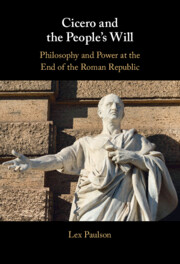Book contents
- Cicero and the People’s Will
- Cicero and the People’s Will
- Copyright page
- Dedication
- Contents
- Acknowledgments
- Abbreviations
- Introduction
- Part I The Practice of Voluntas
- Part II The Philosophy of Voluntas
- Chapter 6 Willpower
- Chapter 7 Free Will and the Forum
- Chapter 8 The Fourfold Self
- Conclusion
- Epilogue
- Appendix Occurrences of Voluntas in the Works of Cicero
- References
- Index
Chapter 6 - Willpower
from Part II - The Philosophy of Voluntas
Published online by Cambridge University Press: 24 November 2022
- Cicero and the People’s Will
- Cicero and the People’s Will
- Copyright page
- Dedication
- Contents
- Acknowledgments
- Abbreviations
- Introduction
- Part I The Practice of Voluntas
- Part II The Philosophy of Voluntas
- Chapter 6 Willpower
- Chapter 7 Free Will and the Forum
- Chapter 8 The Fourfold Self
- Conclusion
- Epilogue
- Appendix Occurrences of Voluntas in the Works of Cicero
- References
- Index
Summary
With the Tusculan Disputations, willpower enters Western thought. This chapter departs from a peculiar decision Cicero makes in his account of the human soul. In previous centuries, Platonists and Stoics had bitterly disagreed on whether the soul was unified or divided into rational and nonrational parts. In the Tusculan Disputations, Cicero announces that he will combine Stoic moral stricture – predicated on the soul’s unity – with Plato’s divided, self-moving soul. The result is a new narrative of inner struggle in which voluntas gains a formal definition at last: “that which desires with reason” (quae quid cum ratione desiderat) (Tusc. 4.12). While drawing importantly on the Hellenistic schools of philosophy, the Latin “force” of volition is foremost. Here, Cicero links together lines of debate that in Greek had run in parallel, rendering hekon, boulesis, and prohairesis by voluntarius and voluntas. His “struggle for reason” thus moves originally beyond Greek accounts of askesis, moral training that emphasized education and cognitive clarity over present effort. An orator zealous to persuade, Cicero paints his account of reason in Roman colors of honor, endurance, and painstaking progress.
Keywords
- Type
- Chapter
- Information
- Cicero and the People’s WillPhilosophy and Power at the End of the Roman Republic, pp. 147 - 168Publisher: Cambridge University PressPrint publication year: 2022

